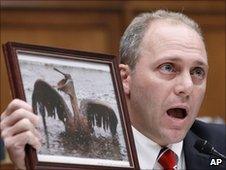Congress tells Hayward BP ignored oil well dangers
- Published
BP chief executive Tony Hayward has been told by an angry US Congressional panel his firm ignored dangers when drilling in the Gulf of Mexico.
House committee on energy and commerce chairman Henry Waxman said BP's "complacency" before the 20 April rig explosion had been "astonishing".
He accused Mr Hayward of "stonewalling" for failing to answer his questions.
As a public relations exercise for BP, the hearing was a disaster, a BBC correspondent says.
Over and over, the BP chief refused to agree with the conclusions of a group of angry, hostile Congressmen and women who seemed in no doubt, after their own lengthy enquiries, that BP had shown a reckless lack of attention to safety, Paul Adams reports.
Infuriated by Mr Hayward's inability or unwillingness to answer their questions, committee members resorted to expressing their disgust, more than one saying he felt insulted.
Eleven people died in the Deepwater Horizon drill rig accident, which left a ruptured well spewing hundreds of thousands of barrels of oil into the Gulf of Mexico.
Despite BP efforts to contain the leak, oil continues to enter the sea, threatening states along the Gulf coast.
BP says it will withhold dividends until the end of the year as part of its response to the spill.
The long-term hope for ending the spill rests with two relief wells now being drilled, one of which has reached two miles (3km) below the seabed, or about two-thirds of its way to its target, US disaster coordinator Admiral Thad Allen reported on Thursday.
It is planned is to seal the leak with concrete but that is not likely to happen until August at the earliest.
'Tremendous risks'
BP's shares rose more than 6% after it agreed to put $20bn (£13.5bn) in a fund to compensate victims of the spill.
The increase halted falls that had led to the company's stock value halving in recent weeks.
Congressman Waxman said in his opening remarks that BP had "cut corner after corner" in order to save money, which led to the explosion and fire on board the Deepwater Horizon.
"We could find no evidence that you paid any attention to the tremendous risks BP was taking," he went on.
"We reviewed 30,000 pages of documents from BP, including your e-mails. There is not a single e-mail or document that shows you paid even the slightest attention to the dangers at this well."
He told Mr Hayward: "You're not taking responsibility, you're kicking the can down the road."
One by one, other Congressmen, both Democrats and Republicans, questioned BP's activities in America in a hearing which lasted some seven hours.
"We are not small people but we wish to get our lives back," said Bart Stupak, playing on a comment made the day before by BP chairman Carl-Henric Svanberg about how BP sympathised with the "small people" of the Gulf, and a recent remark by Mr Hayward about wanting his "life back".

Congressmen were angry at the effects of the oil spill
Texan Republican Michael Burgess expressed surprise when the BP chief said he had not known anything about the well in question until he was told in April that drilling had confirmed an oil discovery.
"But you're the CEO of the company," Congressman Burgess said.
"With due respect," Mr Hayward replied, "we drill hundreds of wells around the world."
"Yeah, that's what scares me right now," said Mr Burgess.
A row erupted within Republican ranks after another Texan Republican, Joe Barton, suggested BP had been subjected to a "$20bn shakedown" by the Obama administration.
Mr Barton, the senior Republican on Mr Waxman's committee, was rebuked by his own party leaders and retracted his words, the Associated Press reports.
"I regret the impact that my statement this morning implied that BP should not pay for the consequences of their decisions and actions in this incident," he said in a statement.
BP pledge
Earlier, as Mr Hayward prepared to testify, a protester briefly disrupted the hearing, shouting that he should be "charged with a crime" before she was removed.
She was identified as Diane Wilson, a fisherwoman from Seadrift, Texas, near the Gulf Coast.
Expressing his "deep regret" for the spill, Mr Hayward repeatedly stressed he was constrained in what he could say by the fact that a number of investigations into the explosion had yet to finish.
"There is nothing I have seen so far that suggests that anyone put costs ahead of safety," he said at one point. "If there are, then we'll take action."
He said he had focused on improving safety for the three years he had been in his post and his priority was ending the spill and clearing up the oil.
"I give my pledge as the leader of BP that we will not rest until we make this right," he said.
Mr Hayward's inability to answer specific technical questions about the situation on the rig angered the panel particularly.
BP's chief executive said answers would be supplied by his firm when they were ready.
The questions, set out in a letter, external to Mr Hayward on Sunday by Mr Waxman and fellow committee member Bart Stupak, include allegations that BP:
Went against the advice of its own plan review regarding the well's design and chose a riskier, cheaper and quicker casing option
Used only six centralisers to make sure the casing ran down the centre of the well bore, rather than the 21 recommended by sub-contractor Halliburton
Rejected warnings by its own plan review and Halliburton in preparations for a cementing job
Decided to forego a recommended safety step in the circulation of drilling mud
Did not deploy a "lockdown sleeve" that would have prevented the seal from being blown out from below